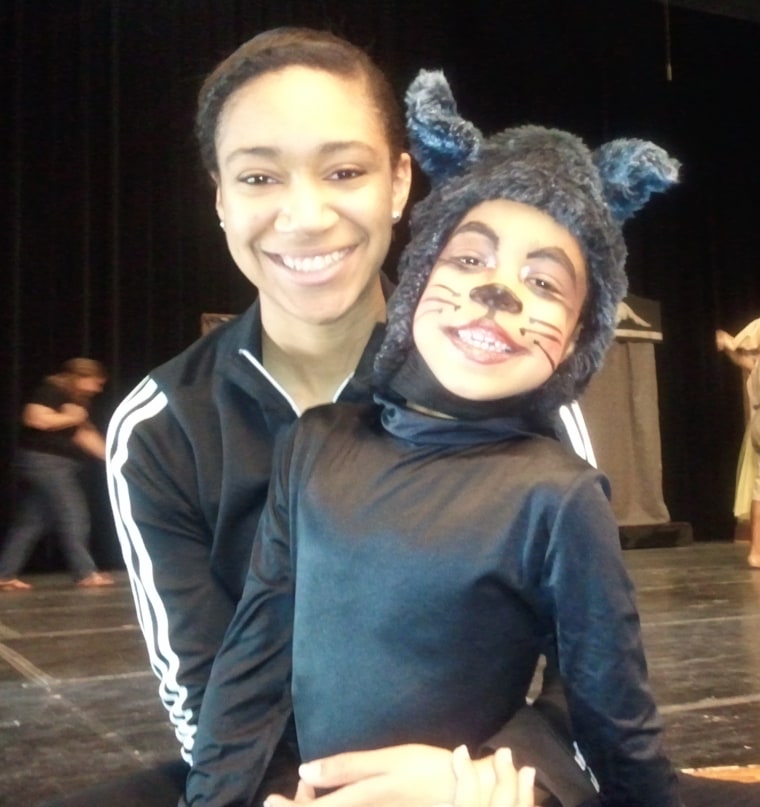This story discusses suicide. If you or someone you know is at risk of suicide please call the U.S. National Suicide Prevention Lifeline at 800-273-8255, text TALK to 741741 or go to SpeakingOfSuicide.com/resources for additional resources.
Tiera Hopkins loved to dance. The fun-loving vibrant teen started dancing at 7 and it was “pretty much her life,” said her mother, Jenny Morales, 47, a client advocate at an insurance company in Elgin, South Carolina. Five days a week, Tiera practiced. When she wasn’t dancing she was hanging out with her tight group of friends or younger brothers. Morales said Tiera was a delight.
“She always kept you smiling — she was always smiling,” Morales told TODAY. “But unfortunately she kept a lot of things to herself. She wasn’t very vocal about her feelings.”

In 2012, at the age of 16, Tiera died of suicide. Morales’ grief still feels overwhelming, but she has become an advocate for destigmatizing mental health in teenagers and encouraging parents and teens to talk about mental health.
Watch TODAY All Day! Get the best news, information and inspiration from TODAY, all day long.
“It starts with teaching them communication — teaching them how to break that stigma. It’s OK to not be OK,” Morales said. “I want teens not only to speak up for themselves but also to speak up for others.”
From vibrant and happy to loss
From the first class, Tiera fell in love with dance.
“It’s just what she enjoyed — and of course, she was wonderful at it. She was a beautiful, beautiful dancer,” Morales said.
Tiera also had a close group of friends that had been inseparable since they met in third grade and she loved being an older sister to her younger brothers.
“She was a very caring young lady,” Morales said.

While Tiera was a good student and never got into trouble at school, about a month before her death, her grades slipped. At the time Morales thought her daughter was overwhelmed with new dance classes and high school.
“We actually had the discussion (that) maybe it is too much for you because your grades are dropping and we cut back on dance,” Morales recalled. "She pretty much lost it. She was like, ‘No, no, that’s my life. You can’t take it away from me.’”
She later learned from Tiera’s friends that Tiera confided in them that she was struggling and she told them she had thoughts of suicide. But they did not realize she was being serious. That’s one reason why Morales has become a mental health advocate. She wants parents and teens to be able to talk about mental health and suicide openly.
“It’s teaching them how to communicate and be a voice for themselves — their friends,” she said. “If they notice something is not right especially if their friend has been forthright, and actually says, ‘My life is worthless’ or ‘I have no purpose,’ or if you just notice a huge or drastic change in your friend, you have to say something.”

But Morales hopes that parents will also talk to their children about mental health and suicide, even if it feels scary or difficult.
“It’s OK to ask directly about thoughts of suicide. ‘Have you thought about taking your life?’” she said. “We need to be listeners … we need to acknowledge what they’re saying and let them know they’re not alone.”
Often people feel afraid to discuss suicide because they worry they’ll put that idea in someone’s head. But Dr. Ken Duckworth, the chief medical officer at the National Alliance on Mental Illness, said that’s not true.
“Mentioning suicide does not activate a new idea within people," he told TODAY. “You do not put suicide in someone’s head.”
Duckworth said many survivors of suicide feel guilty that they didn’t notice a sign or didn’t do something and he wants them to know that a loved one’s suicide is not their fault.
“It’s impossible to know what stressors are on (others),” he said.

Death by suicide has been increasing steadily for every age group since the 1990s, according to the Centers for Disease Control and Prevention. Additionally, the COVID-19 pandemic has brought with it new stressors that could further increase suicide risk, according to experts at the American Psychological Association. It's important for parents to reach out and discuss mental health and suicide with their children. They also need to know that mental health services are available.
“It is valuable for parents to talk about suicide with their teens and to be really candid about it, and maybe even directly ask them how they’re feeling,” Duckworth said.
He also recommends that parents seek mental health counseling and treatment for their children from a mental health professional if they notice a concerning change in their child's behavior or if the child has expressed thoughts about wanting to die or attempt suicide. Duckworth says parents can reach out to the National Suicide Lifeline to get support for themselves and their children as a first step.
After Tiera’s death, Morales started a scholarship for local high school students awarded based on an essay about how they would advocate for others. She hopes that when people hear about Tiera they understand how essential it is to talk to their loved ones about their mental health.
“I want people to understand how important it is to speak up — to be a voice you need help,” Morales said. “I want parents to start the conversation.”

